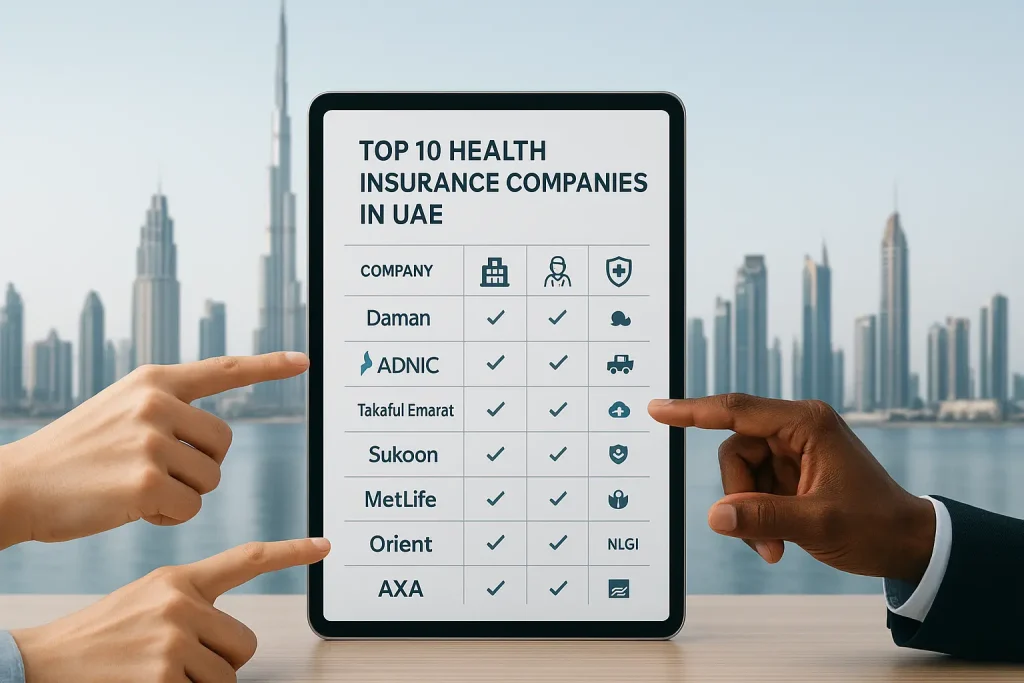Introduction: Navigating the Mandatory Health Insurance Landscape
Choosing the right health insurance in the UAE—a region with a robust but complex healthcare system—is often overwhelming, particularly for expatriates and multi-Emirate employers. The challenge is not simply finding a list of providers, but understanding the nuanced regulatory requirements that define mandatory coverage. As of January 1, 2025, health insurance became compulsory for all private sector employees and domestic workers across every Emirate.
This in-depth guide is designed to cut through the complexity. We provide an expert comparison of the top 10 health insurance companies in the UAE based on network size, claims efficiency, and financial stability. Crucially, we offer the definitive breakdown of the new 2025 mandatory schemes, comparing the Dubai Health Authority (DHA) Essential Benefits Plan (EBP) against the nationwide Basic Health Scheme, ensuring your policy is fully compliant and offers superior value.
Executive Comparison: Why Our Top 10 List Matters
The competitive landscape for health insurance is dominated by providers who excel in two key areas: regulatory compliance (DHA/DOH status) and network reach. Our list synthesizes the key players, encompassing local national powerhouses that manage government schemes and global carriers that cater to the International Private Medical Insurance (IPMI) market.
The selection criteria focus on:
- Participating Insurer (PI) Status: Companies licensed by the DHA to sell mandatory low-cost plans.
- Financial Strength and Claims Processing: Reputation for efficient and reliable claims handling.
- Network Breadth: The size and quality of their network of clinics, hospitals, and pharmacies across the UAE.
| Insurer Name | Provider Type | Key Regulatory Status | Noted Specialization/Focus | Partnerships with International Carriers |
|---|---|---|---|---|
| Daman | Local/National | PI License (DHA/DOH) | Government Schemes/Largest Network | AXA Global |
| Sukoon (Oman Ins.) | Local | PI License (DHA) | Comprehensive/Takaful Options, Strong Local Network | Bupa Global |
| ADNIC | Local | PI License (DHA) | Corporate & Individual Solutions, Wide Range | N/A |
| GIG Gulf | Regional | PI License (DHA) | Robust Local/Regional Coverage, Motor & Health Combined | N/A |
| Orient Insurance PJSC | Local | PI License (DHA) | Premium Plans/Financial Stability | Allianz |
| Cigna | Global | PI License (DHA) | Expat Tailored Plans (EBP options) | N/A |
| Salama Takaful | Local (Islamic) | PI License (DHA) | Sharia-Compliant Takaful | April International |
| MetLife | Global | PI License (DHA) | Employer/Individual Coverage, Multinational Focus | N/A |
| Dubai Insurance | Local | PI License (DHA) | Strong risk management/International Plans | William Russell |
| SAICO Insurance | Regional | PI License (DHA) | Versatile Plans for Expats and Businesses | N/A |
The Core of UAE Healthcare: Mandatory Insurance in 2025
Health insurance is not optional for residents of the UAE; it is a mandatory prerequisite for issuing and renewing residency visas. The employer is solely responsible for purchasing the health insurance policy for employees.
Critical Regulatory Distinction: DHA EBP vs. Nationwide Basic Health Scheme
The most critical regulatory detail that determines compliance and coverage limits in 2025 is the Emirate of residence. The UAE now operates under two distinct basic mandatory schemes:
- Dubai Health Authority (DHA) Essential Benefits Plan (EBP): Mandatory for Dubai residents earning AED 4,000 or less per month.
- 2025 Basic Health Scheme: Mandatory for private sector employees and domestic workers in the Northern Emirates (Sharjah, Ajman, RAK, UAQ, Fujairah).
The difference in coverage caps between these two basic plans is significant and often overlooked:
| Feature | DHA Essential Benefits Plan (EBP) – Dubai | 2025 Basic Health Scheme – Nationwide (Northern Emirates) |
|---|---|---|
| Primary Geographic Scope | Dubai Residents (Salary < AED 4,000) | Private Sector/Domestic Workers in Northern Emirates |
| Annual Premium (Approximate) | Starting from AED 690/year | AED 320/year (Total ~361.20 Dhs including fees) |
| Annual Maximum Limit | AED 150,000 for overall coverage | AED 50,000 (Inpatient) + AED 10,000 (Outpatient) |
| Co-payment (Inpatient) | 20% co-insurance | 20% co-payment (Capped at AED 500/visit, AED 1,000/year) |
| Chronic/Pre-existing Conditions | Covered (Varies, some Cigna EBP plans may apply 6-month wait for new residents) | Covered immediately (No waiting period) |
| Provider Network Size | Wide network (Sukoon EBP offers full coverage across UAE) | Limited network (approx. 7 hospitals, 47 clinics, 44 pharmacies) |
Multi-Emirate Compliance Risk: Ensuring Coverage Across Dubai, Abu Dhabi (Daman/Thiqa), and the Northern Emirates
For companies with operations across multiple Emirates, a single policy will not suffice for basic mandatory coverage. Compliance requires purchasing distinct plans based on the employee’s residency:
- Dubai: DHA-licensed EBP or a superior plan.
- Abu Dhabi: DOH/Thiqa Program (typically managed by Daman).
- Northern Emirates: The new AED 320 Basic Health Scheme, effective January 1, 2025.
This fragmented regulatory system means employers must consult specialized brokers to avoid compliance risks and ensure all employees are covered under the legally mandated minimum in their respective jurisdiction.
Deep Dive: Reviewing the Top 10 Providers (By Market Segment Focus)
Category 1: Local Titans & Regulatory Adherence (e.g., Daman, ADNIC, Sukoon)
Local and national insurers form the backbone of the UAE’s health system due to their regulatory compliance and massive network coverage.
- Daman Health: The leading national insurer, Daman manages the government-mandated Thiqa program in Abu Dhabi and provides robust networks for both basic and premium plans across the UAE. It is crucial for both corporate and individual basic compliance.
- Sukoon Insurance (formerly Oman Insurance): A major local player with strong financial stability and a history of providing comprehensive plans. Sukoon is frequently cited for its participation in the DHA EBP and its crucial local partnership with global giants like Bupa.
- ADNIC (Abu Dhabi National Insurance Company): Offers a wide range of solutions for individuals and large corporations, known for its local expertise and strong digital services.
Category 2: Global Providers for Expats (IPMI) and Local Partnerships
Expatriates often seek International Private Medical Insurance (IPMI) for broader geographic coverage (Worldwide excluding USA or Worldwide including USA). However, to be legally compliant in the UAE, global providers must partner with a locally licensed entity. This partnership structure ensures seamless regulatory adherence while leveraging the global insurer’s claims administration and high-end benefits.
- Cigna: A major global player known for flexible and comprehensive expat health plans, including a DHA-compliant EBP.
- Bupa Global (via Sukoon): Bupa Global leverages Sukoon’s local license and network to offer premium international plans to expats, with Bupa typically handling the global claims administration.
- AXA – Global Healthcare (via Daman): AXA partnered with Daman in 2024 to launch a locally licensed IPMI product, with Daman managing the domestic network and compliance.
- Now Health International (via Arabia Insurance Company S.A.L.): Now Health focuses on digital tools and high-quality international solutions, while Arabia Insurance S.A.L acts as the local entity responsible for insuring the business within the UAE.
Strategic Financial Decisions: Takaful vs. Conventional Insurance Explained
A significant segment of the UAE market is served by Takaful, or Islamic insurance, providers such as Salama Takaful. Understanding the core difference is essential for a truly informed choice:
Takaful (Islamic Insurance)
- Principle: Built on mutual cooperation (Ta’awun) and shared responsibility.
- Fund Ownership: Participants own the fund and contribute to cover member claims.
- Investments: Funds are invested only in Shariah-compliant businesses, avoiding interest (Riba).
- Unique Benefit: If the fund generates a surplus, a portion of the profits may be distributed back to the participants.
Conventional Insurance
- Principle: Operates on risk transfer from the individual to the company.
- Fund Ownership: The insurance company owns the premium fund and retains any surplus profits.
- Investments: Can include interest-bearing avenues and other conventional financial instruments.
- Unique Benefit: N/A (Profits are retained by the company).
Takaful is open to non-Muslims who prefer an ethical, community-focused, and potentially more advantageous financial structure.
Cost Transparency: What You Will Actually Pay in the UAE (Price Bands)
Insurance costs vary drastically based on coverage, age, network size, and pre-existing conditions. Establishing clear price bands helps users set realistic expectations.
Breakdown of Annual Premiums: Basic, Mid-Range, and Premium IPMI Plans
| Plan Tier | Approximate Annual Premium Range (AED) | Typical Coverage Focus |
|---|---|---|
| Basic (Mandatory) | AED 320 to AED 1,500 per year | Compliance, Essential inpatient/outpatient, Limited network |
| Mid-Range | AED 3,000 to AED 7,000 per year | Broader network, Specialist access, Higher annual limits |
| Premium/IPMI | AED 10,000 to over AED 20,000 per year | Worldwide coverage, Dental/Optical, High annual limits, Direct billing |
Factors Affecting Your Premium (Age, Visa Status, Pre-existing Conditions)
- Age: Premiums increase significantly for individuals over 60. Anyone over the age of 64 applying for the Basic Health Scheme must submit a medical disclosure form with recent reports.
- Plan Scope: Moving from GCC coverage to Worldwide coverage (including or excluding the USA) results in exponential cost increases.
- Chronic and Pre-existing Conditions: While the new Basic Health Scheme covers chronic illnesses immediately without a waiting period, higher-tier commercial plans may still apply waiting periods or require medical underwriting.
Execution Roadmap: How to Compare and Purchase the Best Policy
The best content should be actionable. To effectively compare plans, utilize a Health Insurance Premium Calculator UAE. Tools like these allow you to input your specific demographics (age, salary, Emirate of residence) and instantly generate customized quotes from multiple top providers, addressing the high commercial intent of your search.
Get Your Customized Quotes NowJargon Buster: Essential Terms You Must Know
The financial complexity of health insurance is often cited as a major point of user confusion, with many users misunderstanding terms like “deductible,” “Explanation of Benefits (EOB),” and “out-of-pocket maximum”. Look for resources that clearly define key terms:
- Co-payment/Co-insurance: Your fixed share of the cost for a service (e.g., 20% co-pay on services for the DHA EBP).
- Deductible: The fixed amount you must pay out-of-pocket before your insurance coverage starts.
- Direct Billing vs. Reimbursement: Direct billing means the insurer pays the provider directly (common for in-network care); reimbursement means you pay upfront and submit a claim for later payment (common for out-of-network or international care).
FAQ: Navigating UAE Health Insurance
Is health insurance mandatory for all expats in the UAE?
A: Yes, health insurance is mandatory for all expatriates and residents in the UAE. Employers are responsible for providing coverage for their employees.
What is the maximum coverage under the cheapest health insurance plans in 2025?
A: The maximum coverage varies by Emirate. The Dubai DHA EBP offers up to AED 150,000 in overall coverage. The new Nationwide Basic Health Scheme (Northern Emirates) offers a maximum of AED 50,000 for inpatient care.
Can I get coverage if I have a pre-existing condition?
A: Yes. The new AED 320 Basic Health Scheme covers chronic diseases and pre-existing conditions without a waiting period. For higher-tier commercial plans, coverage is usually subject to medical underwriting, and some plans may impose a waiting period (e.g., 6 months) for new residents.
What are the best health insurance companies for seniors over 65 in the UAE?
A: Individuals over 64 seeking mandatory coverage must submit a medical disclosure form and recent medical reports to their chosen insurer. Due to the complex underwriting involved, seeking advice from a specialist broker is essential to find an insurer among the Top 10 (like Sukoon or Daman) that offers customized plans for seniors.
What is the average claim processing time for insurance in the UAE?
A: Claim processing timelines are regulated by the DHA and DOH, generally ranging from 15 to 30 working days, depending on the complexity of the case and the regulatory authority.
Conclusion
Successfully securing the best health insurance in the UAE means moving beyond a simple list of top 10 health insurance companies in the UAE. It requires a nuanced understanding of the 2025 regulatory framework, particularly the distinction between the DHA EBP and the new Basic Health Scheme. By prioritizing providers with strong regulatory standing (PI status), comparing costs against the detailed coverage limits, and choosing a plan that matches your residency and financial needs, you can ensure both full compliance and optimal healthcare security. Use our recommended comparison tools to get actionable, customized quotes today.






